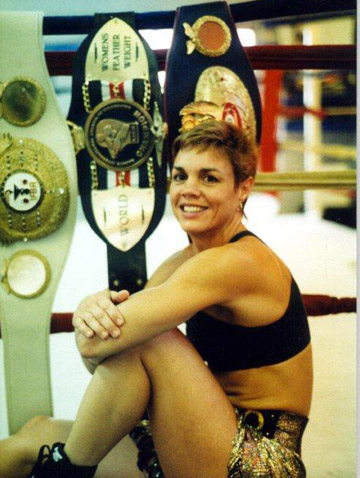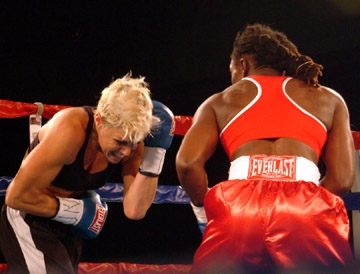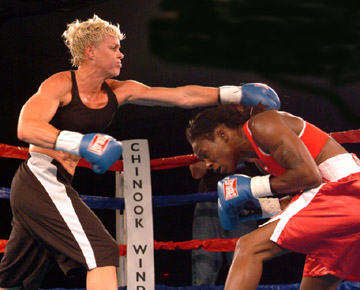Bonnie Canino Talks Boxing – by Bernie McCoy
The Olympic Games begin in a few weeks and during this quadrennial event the sport of Women’s boxing is making a historic debut. Much has been written about what the debut of female boxers in the 2012 Games will mean to the sport; what impact the Games will have on the future of female boxing, both amateur and professional; and how females in a boxing ring, throwing punches, will be perceived by sports fans who, largely, have been either unaware or only minimally cognizant of the fact that throughout the world, many very talented female athletes participate, at a high level, in a sport that has been, for far too long, certainly within the framework of the Olympics, a male preserve. A considerable amount of the talk and speculation has ranged from ill-focused analysis to overblown wishful thinking and in search of a clear-eyed, objective perspective from someone who would qualify as an “expert witness” on the sport of Women’s boxing, I made a call to Florida, last week, to talk to Bonnie Canino. “It’s what we’ve been working on since 2001,” was Canino’s terse, concise opening line about Women’s boxing in the 2012 Games.

Bonnie Canino – retired multi-world champion
There are many names associated with female boxing in this country and then there is a much more exclusive core of names that “Is female boxing” in the US. Bonnie Canino fits comfortably in that exclusive core. She was a professional boxer in the mid 1990s (11-4) and is now, primarily, best know, in boxing circles, for guiding one of the most successful amateur programs in the country from her gym in Dania Beach, FL. She has been a coach with the women’s teams for US Boxing and on the coaching staff at the World Games. Why she has not been included, in some capacity, on the current US Olympic team is a question that has been frequently heard in the boxing community. Bonne Canino has spent over 30 years in the sport and it’s been pretty much a one-way arrangement: Canino has been on the giving end with a sport that is not renowned for providing much in return.


Photo by Dean Ingram – Canino takes fight at
last minute against Chevelle Hallback – June 4, 2004
Many in boxing have Bonnie Canino tales that accurately reflect her three decades in the sport, but June 4, 2004 is as good an example as any. Canino was accompanying a fighter to Oregon for a card that featured Chevelle Hallback who, at the time, was coming into prominence as a top ranked lightweight fighter. She had just come off a close loss to Mary Jo Sanders and would, the following month, win the WIBA super featherweight title against Layla McCarter. The Oregon fight was on TV and, with Hallback featured, was an important event for both the fighter and the sport. At the last minute, Hallback’s opponent dropped off the card, jeopardizing both the bout and the TV exposure. No last minute replacement fighter could be found, until Bonnie Canino volunteered to step in the ring with Hallback who was 20-4-1 at the time in addition to being ten years younger than Canino. One might surmise that the resulting bout was a light sparring session, but that attitude would only indicate a distinct lack of knowledge of what goes into the makeup of female athletes such as Chevelle Hallback and Bonnie Canino. Both fighters came out “winging” from the opening bell and while Hallback prevailed throughout, Canino was still coming forward when the bout was stopped in the fourth round. Chevelle Hallback got four good rounds of work, Women’s boxing got some valuable TV time and Bonnie Canino got one more professional bout, after having been retired from the ring for nearly five years.
I remembered seeing a tape of the Oregon bout when I called Bonnie Canino last week to talk about Women’s boxing and the upcoming Olympics. Canino is the type of personality who is always well prepared for whatever task is at hand: training fighters, running a first class gym or spending time explaining boxing with a unique combination of intelligence, insight and experience. As she did in the ring, Canino begins conversations by coming straight forward, “The Olympics can be a very big deal for the sport of Women’s boxing. A gold medal would be a pinnacle of achievement for any female fighter and would immediately surpass many of the so-called titles that currently exist in the sport. A female gold medal winner could do exactly what Sugar Ray Leonard did, go directly from the Olympics to being a major force in the sport. Will it happen? I think we have three very good US fighters heading for the Games, any one of them is capable of getting to the podium.”
Asked about the support system for the female boxers, Canino replied, “They (US Boxing) are moving in the right direction. They cleaned house and reorganized and the results are positive. The coaches that are serving on the team are very good boxing people and our fighters are in good hands.” Had Canino been approached to be part of the team? “There was some discussion, but they went in a different direction. Look, this is, hopefully, just the first step for female boxing in the Games, it can only get bigger and better. There will be future opportunities.”
As to the future, one change Canino foresees is the possibility of professional fighters in the Games. “Let’s face it, many of the “amateur” boxers around the world are, literally, professional. They are subsidized by their governments which provide them with good money and a living style that allows them to concentrate solely on boxing. If that’s not the definition of a professional fighter, I’m not sure what is. Our boxers get no benefits of that sort and, as a consequence, simply don’t have the ability to focus, exclusively on their sport. Would including professionals in the Olympic mix be the answer? Maybe, but that’s what I mean, this is the first year for female boxing in the Games, it’s going to be a learning experience for everyone and the future will bring changes, hopefully for the better, for both the sport and the athletes.”
“But make no mistake about it,” Canino continued, “this is a big step forward for the sport simply because anything associated with the Olympics is going to have a global impact on female boxing, both amateur and professional. If nothing else, female boxers will be showing up on the television screen much more often than they have in recent years. Maybe, just maybe, there will be a resurgence of what happened when women first started getting TV coverage back in the nineties; all of a sudden, boxing fans might come to the realization that ‘ hey, those women know what they’re doing in there, they can fight ‘ ”
As we were winding up, I mentioned the night in Oregon, eight years ago which, of course Canino remembers, “Yeah, we (the sport) were still getting some TV coverage in those days and the fighters were benefitting because of it. It was important and when Chevelle’s opponent dropped out, everybody stood around looking at each other, thinking ‘ now what.’ Nobody else had any ideas, so I said, ‘ I’ll fight, ‘ and of course it wasn’t one of my best nights and I didn’t object when the ref stepped in and stopped it.”
In point of fact, it was a night that said everything you ever needed to know about Bonnie Canino and boxing and how she has graced the sport for a lot of years. And if the 2012 Olympic Games trigger a resurgence in the sport of Women’s boxing, there will be a critical need for a lot more leadership in the sport than currently exists today. Women’s boxing, more than ever, will need experienced, “can do” people, preferably women, preferably like Bonnie Canino. Women who will do exactly what Canino did that night in Oregon. Step up.
Bernie McCoy
|
|